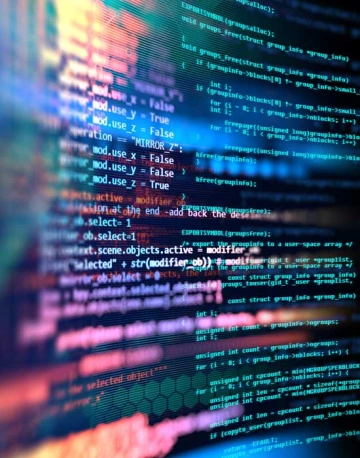Bioinformatics
Bachelor of Science
Quick Facts

Top 5%
Online Bachelor's
Program in the Nation
- U.S. News & World Report, 2026
#1 in the
Southwest
Times Higher Education
- World University Rankings, 2026
Bioinformatics is an emerging and highly interdisciplinary area of study that applies computational techniques to manage, analyze, and understand biological information.
The Bachelor of Science in Bioinformatics equips you with the skills and expertise, spanning both computational and biological domains, necessary to succeed in this rapidly growing field.
Rapid technological advances in recent years have produced an explosion in the scale and variety of biological data available. This has led to an increased demand for bioinformatics professionals capable of producing highly sophisticated computational algorithms and tools, coupled with the deep biological knowledge necessary to apply those tools effectively.
The Bioinformatics BS curriculum integrates a strong foundation in evolutionary biology with genetics, computer science, scripting/programming, and data management coursework. You will receive ample opportunities to analyze and interpret various data.
Completion of this program will prepare you to pursue graduate and professional degrees, or transition to professions in bioinformatics-related fields. Graduates of the program have entered careers in biomedical informatics, pharmaceutical development, medical and clinical research, biotechnology, data analysis, database development and implementation, and software development and engineering.
Completion of this degree requires two Organic Chemistry labs. You may complete this requirement via Arizona Online or in an Immersion/Hybrid format requiring 3.5 days per lab at the University of Arizona Main Campus. Learn more about Organic Chemistry labs here.
*Residents of some U.S. Territories may not be eligible. Please see our Eligibility & State Authorization page for more information.
The core curriculum for this program includes:
This course is an overview of and introduction to the field of bioinformatics. There will be featured talks by faculty who conduct research in bioinformatics and computational biology, as well as scientists from the biotechnology industry.
Learn to develop skills in manipulating complex next-generation biological data sets. Gain proficiency with the Unix command line and python scripting, and learn to synthesize data from multiple sources to evaluate hypotheses.
Examine the basic genetic principles that govern the inheritance of all living organisms, with an emphasis on molecular, quantitative, population, and evolutionary genetics.
Examine basic processes and patterns of evolution, including major evolutionary transitions in individuality, natural selection and mechanisms of evolution, genetic analysis of evolutionary change and adaptation, species and speciation, phylogenetics, and the integration of evolution and development.
Learn the fundamental concepts and tools used to convey the information contained within large, complex data sets through a variety of visualization techniques.
This course introduces you to the theory and practice of data mining for knowledge discovery. Topics include understanding varieties of data, classification, association rule analysis, cluster analysis, and anomaly detection.
Learn how to use industry-standard tools and practices to make large data sets usable for scientists and other decision makers. You will be introduced to a variety of technical tools for data management, storage, use, and manipulation.
Explore the ideas and techniques used by scientists and entrepreneurs to exploit data in order to create knowledge and make money. Topics and projects may include recommender systems, spam filters, topic extraction from documents, and an introduction to neural networks.
Outcomes
Skills
Earning your Bachelor of Science in Bioinformatics will build core skills, including:
- Data analysis
- Data management
- Programming
- Computer literacy
- Scripting languages
- Research methodology
- Project management
- Systems analysis
- Clinical research
- Communication
- Problem solving
- Critical thinking
Potential Career Paths
Graduates of the Bachelor of Science in Bioinformatics program will be prepared to pursue the following careers:











